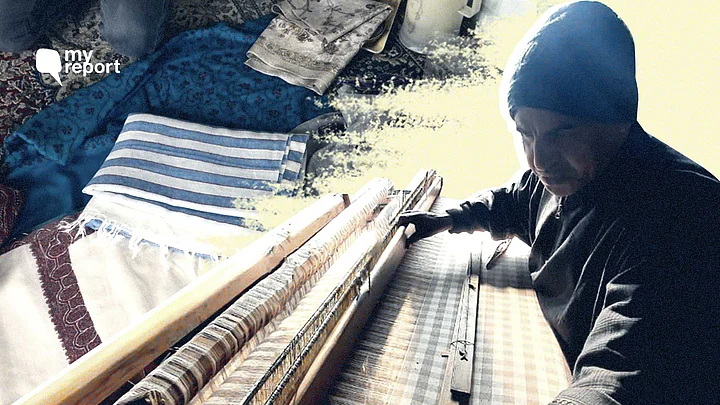Khadi and Village Industries Commission and Khadi institutions in Uttar Pradesh's Varanasi and Ghazipur recently announced that they will come together for a tie-up in which Pashmina wool would be processed in the state.
Though the purpose of the move was to give a boost to the industry in Uttar Pradesh, it is likely to adversely affect the artisans in Kashmir who have worked in the trade for generations.
The artisans feel that this move to promote Pashmina industry in UP will affect not only their livelihood, but also their heritage and traditional work.
I met artisans who produce Pashmina at Zonimour Soura in Srinagar and spoke to them about their work and how they feel about the recent move by the KVIC, a body under the centtral government's Ministry of Micro, Small and Medium Enterprises.
'Our Livelihood Would Be Affected'
Pashmina wool products are indigenous to the high altitude regions of Leh-Ladakh and Jammu and Kashmir, and artisans have been engaged in the trade for generations. With the recent move, these artisans are now concerned about their employment.
From the selection of the wool, to weaving and finally producing the material, a network of artisans in Jammu and Kashmir are completely dependent on this work for their livelihood.
"I have been involved in this work for ages. Even generations before me did the same. COVID-19 had a huge impact on our work as it affected exportation and most of our products are usually traded outside. Our work is getting back on track, gradually."Mustaq, Artisan
This is the only work the artisans are trained at, with the craft being passed on from one generation to another. Speaking to me, they said that the people from all over the country visit Kashmir for the region's indigenous handicrafts, and fear that their traditional work would be taken away from them.
"I have been involved in this work for 20 years. If the government goes ahead with their new move of processing Pashmina wool in Varanasi or other states, it will gradually affect the employment here. We have a family to sustain and small children."Bilal, Artisan
"There are many difficulties we already have to face as our work is diminishing with time, and having other states start with our heritage work would affect our livelihood badly," added Bilal.
Zubair who has been in the business of making Pashmina shawls for the past five years told me that his family has worked in the industry for 40 years. It has become very difficult for them to survive on what they make from this work.
"Earlier the shawls we made were exported worldwide and that's what we are famous for but COVID-19 disrupted it all," Zubair added.
He said that they have a team of 12-15 people, who work for more than 9-10 hours a day and this is their only way of survival. On the days they work really hard, they barely make around Rs 500.
To prepare a single shawl, it usually takes around two days and the preparation before that takes around four days. In a month, they are able to make around 10-12 shawls.
The Pashmina workers said that the production of Pashmina is 'not a one man's work', so if the work is affected, thousands of families that directly or indirectly depend on the industry to earn their livelihood will suffer.
The new plan to process Pashmina in Uttar Pradesh will have terrible consequences for people in the Jammu and Kashmir region, as not just weavers but people involved in works of sozni, spinning, and designing would be affected as well.
"If the production or the processing of Pashmina shawls starts in other states it will also affect the quality of the product too," said Zubair.
People here have been in this business for years. They know it better and are much more experienced too. Kashmir's economy is mostly dependent on these business and they shouldn't be taken away from us.
(All 'My Report' branded stories are submitted by citizen journalists to The Quint. Though The Quint inquires into the claims/allegations from all parties before publishing, the report and the views expressed above are the citizen journalist's own. The Quint neither endorses, nor is responsible for the same.)
